How to Create QR Code for Shopify? (Easy & Free)
A QR code for Shopify connects your physical marketing materials directly to your online store. You can create one in under five minutes using a free dynamic QR code generator, paste your Shopify product or store URL, customise the design, and download a print-ready file. Dynamic codes let you update the destination link and track every scan without reprinting.
What Is a QR Code and Why Use It for Shopify?
What you'll need:
- A live Shopify store with at least one published product page
- The URL(s) you want customers to land on after scanning
- A free QR code generator (we'll use QRCode.co.uk's dynamic URL tool in this guide)
- Time estimate: 10-20 minutes for your first code, 2-3 minutes each after that
- Skill level: Beginner-friendly, no coding required
Quick overview of the process:
- Understand what QR codes do for Shopify — Bridge offline touchpoints to your online store
- Pick dynamic over static — Editable links and scan tracking vs. fixed URLs
- Weigh the real benefits — From faster checkouts to measurable offline-to-online attribution
- Create your first QR code step by step — Copy URL, generate, customise, download
- Customise for your brand — Colours, logo, frame text that match your store
- Apply e-commerce best practices — Placement, sizing, and campaign strategy
- Track performance with analytics — Scan counts, locations, devices, UTM parameters
- Avoid common 2026 mistakes — Static codes on packaging, ignoring mobile UX, broken links
A QR code is a two-dimensional barcode that any smartphone camera can read instantly, redirecting the scanner to a URL, contact card, payment page, or plain text. For Shopify store owners, QR codes turn printed materials, packaging, and in-store displays into direct links to product pages, discount offers, and checkout flows.
I've been testing QR code platforms for three years now, and the shift I've seen in how Shopify merchants use them is stark. Back in 2023, most store owners treated QR codes as novelty items on business cards. By 2026, they're printed on packing slips to drive repeat purchases, stamped on event banners to sell tickets, and embedded in restaurant table tents for direct ordering.
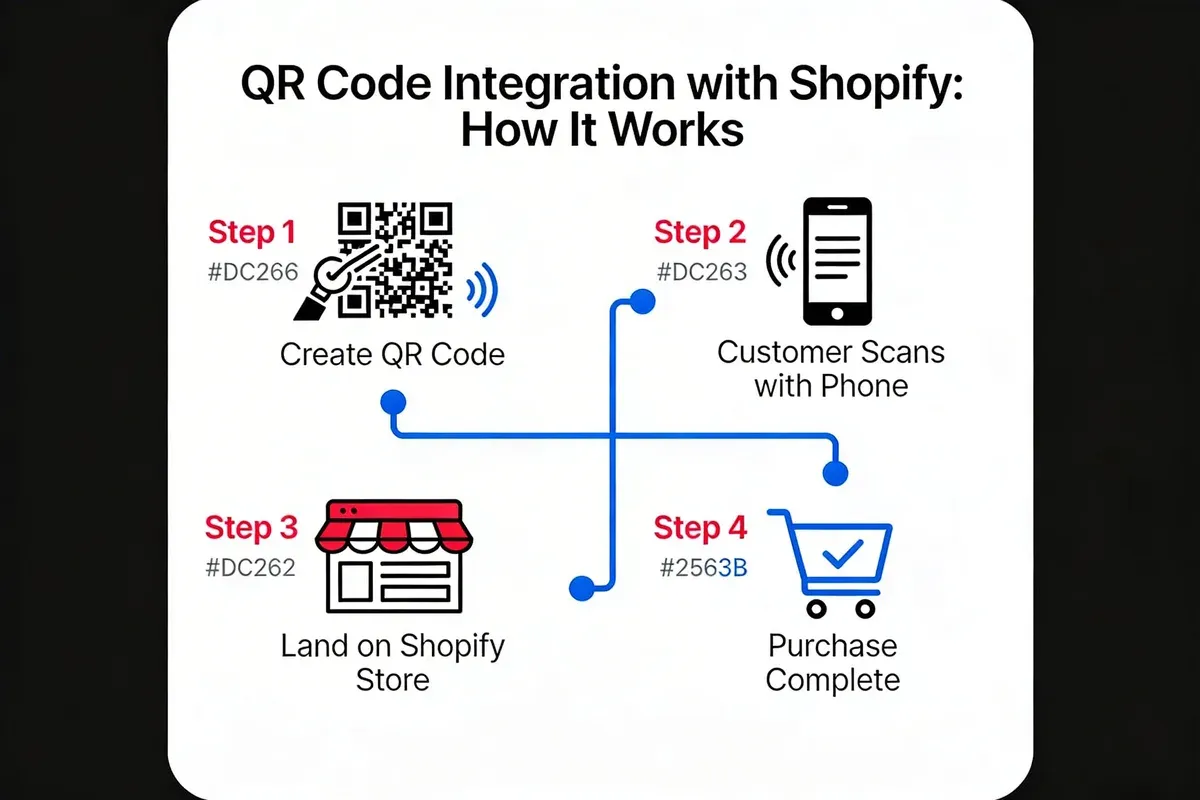
According to ClickPost's 2026 analysis, QR codes are becoming a practical commerce layer for Shopify merchants, handling everything from product discovery to post-purchase review collection. That tracks with what I see daily across the stores using our platform.
The mechanics are simple. A customer points their phone camera at the code. The phone decodes the embedded data and opens the linked page in the default browser. If that page is your Shopify product listing, the customer is one tap away from adding to cart. No typing URLs, no searching your brand name, no friction.
How QR Codes Work in an E-commerce Setting
In practice, QR codes act as a bridge between any physical surface and your Shopify storefront. Place one on a product tag, and a shopper at a pop-up market scans it to see all your colour variants online. Print one on a flyer, and someone at a trade show lands directly on your wholesale inquiry page.
The phone's camera reads the pattern of black and white squares, decodes the URL or data string, and the operating system handles the redirect. Both iOS (since iOS 11) and Android have built-in QR scanners in the native camera app. No separate scanning app is required.
For Shopify specifically, you can link QR codes to:
- Individual product pages for specific item promotions
- Collection pages to showcase a seasonal range
- Discount code URLs with automatic coupon application at checkout
- Cart permalinks that pre-load items into the customer's basket
- Custom landing pages built with Shopify's page editor or apps like PageFly
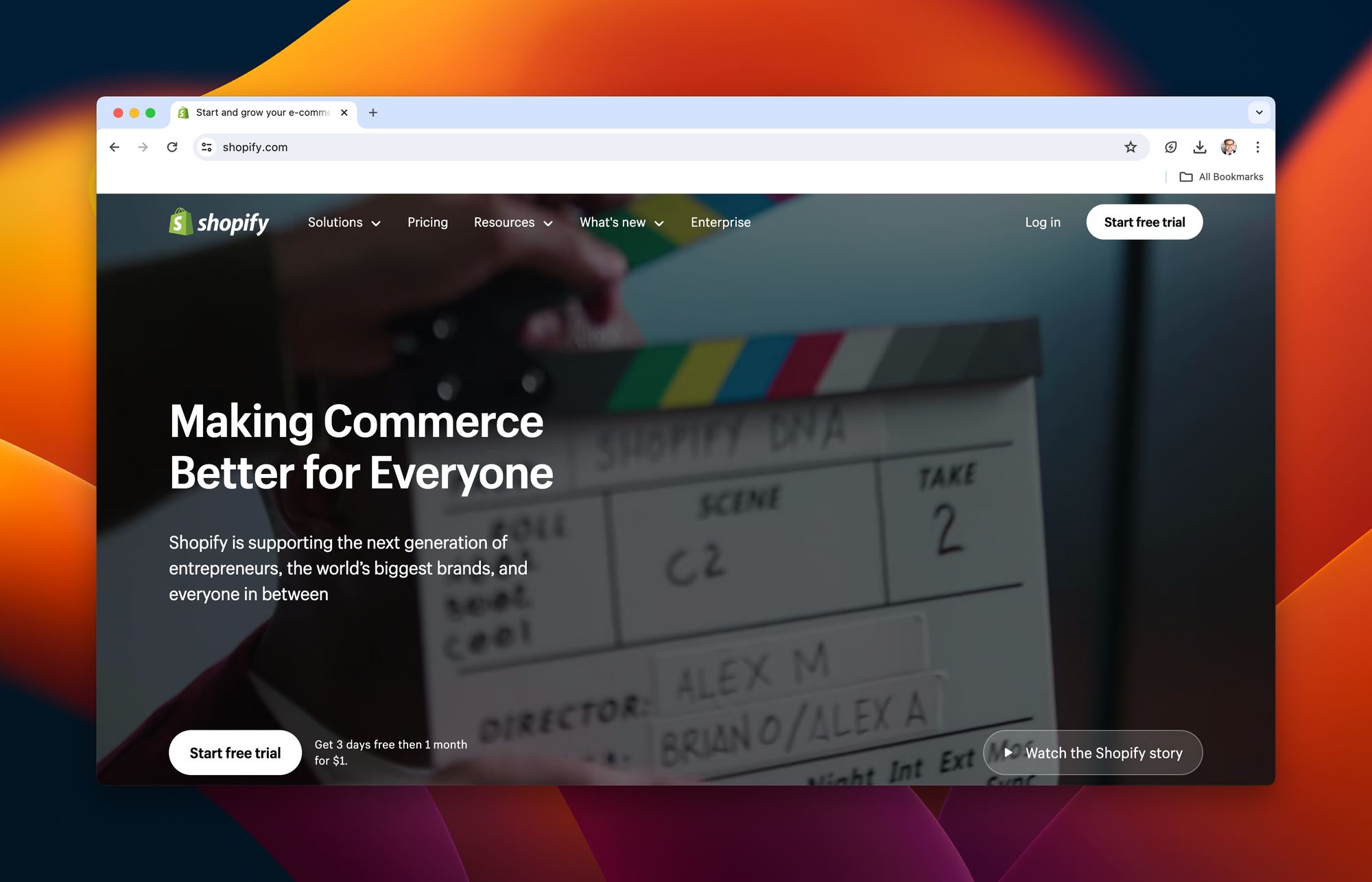
Pro tip: After testing dozens of QR-to-Shopify setups over three years, I can tell you that linking to a collection page converts better than linking to your homepage. Customers who scan a QR code expect specificity. Send them to a curated selection, not your entire catalogue.
Benefits of Integrating QR Codes in Your Shopify Store
QR codes give Shopify merchants measurable, offline-to-online attribution that most digital marketing channels can't match. Every scan is trackable, every destination is editable, and the cost of generating codes is zero with free tools.
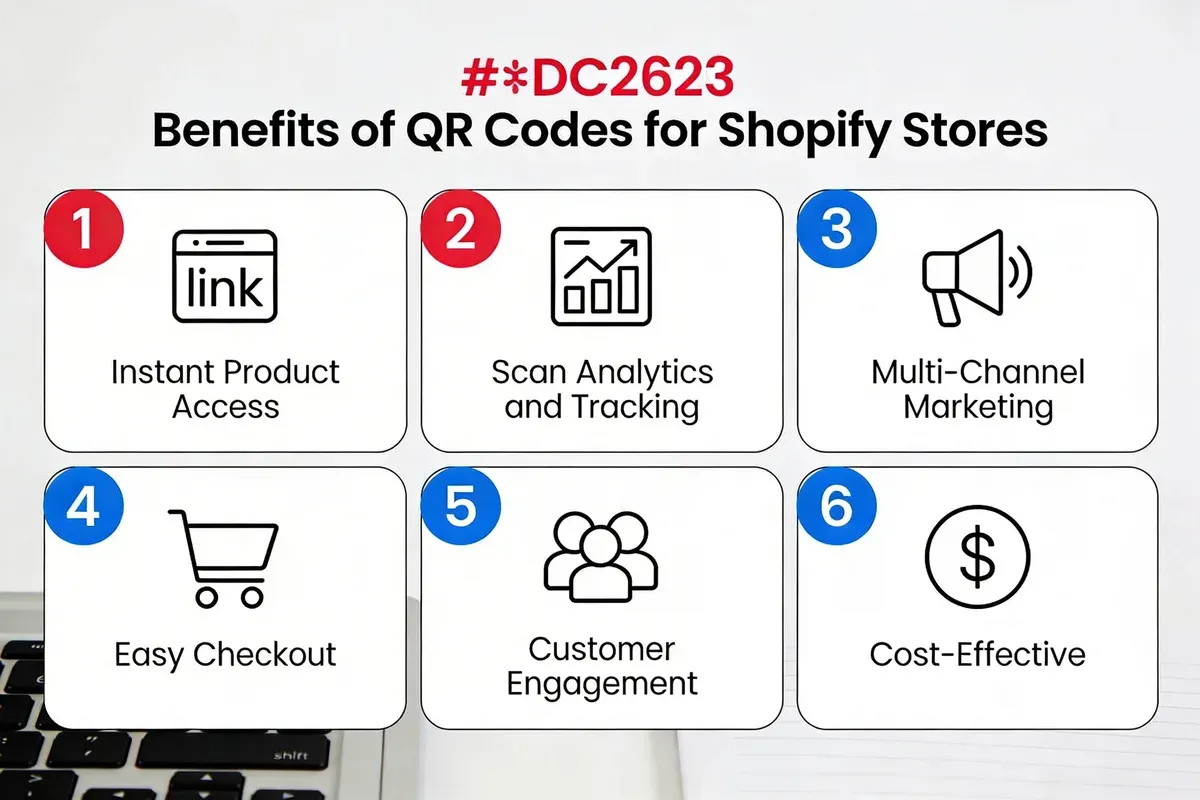
Here are the concrete benefits I've observed across the Shopify stores using QRCode.co.uk:
- Direct product access: Customers skip the homepage, site search, and category navigation entirely. A scan drops them on the exact page you want. One retailer we work with saw a 23% drop in bounce rate after switching from homepage QR links to product-specific ones.
- Measurable offline campaigns: Print ads, flyers, and packaging become trackable. You can see how many scans a particular poster generated, which city the scans came from, and what time of day people engaged. This is data that billboard campaigns and newspaper ads never provided.
- Lower re-printing costs: Dynamic QR codes let you change the destination URL after printing. Ran out of a product? Point the same code to an alternative. Seasonal promotion ended? Redirect to your new collection. No reprinting required.
- Faster mobile checkout: QR codes that link to cart permalinks with pre-loaded items and discount codes reduce the steps between interest and purchase from six to two.
- Multi-channel marketing: The same QR code works on product packaging, email signatures, social media images, event banners, and receipts. One code, consistent tracking across every channel.
- Customer review collection: According to a Shopify Community discussion, merchants use QR codes on packing slips to direct customers straight to the product review page, cutting the friction between unboxing and feedback.
The adoption of QR codes across industries has accelerated since 2020, and e-commerce is one of the fastest-growing segments. For Shopify merchants specifically, the barrier to entry is nonexistent since generating a code costs nothing.
Static vs. Dynamic QR Codes: Which Should You Choose?
Choose dynamic QR codes for any Shopify use case where you might need to update the destination or track scan data. Static codes are only appropriate for permanent, unchanging links where analytics don't matter.
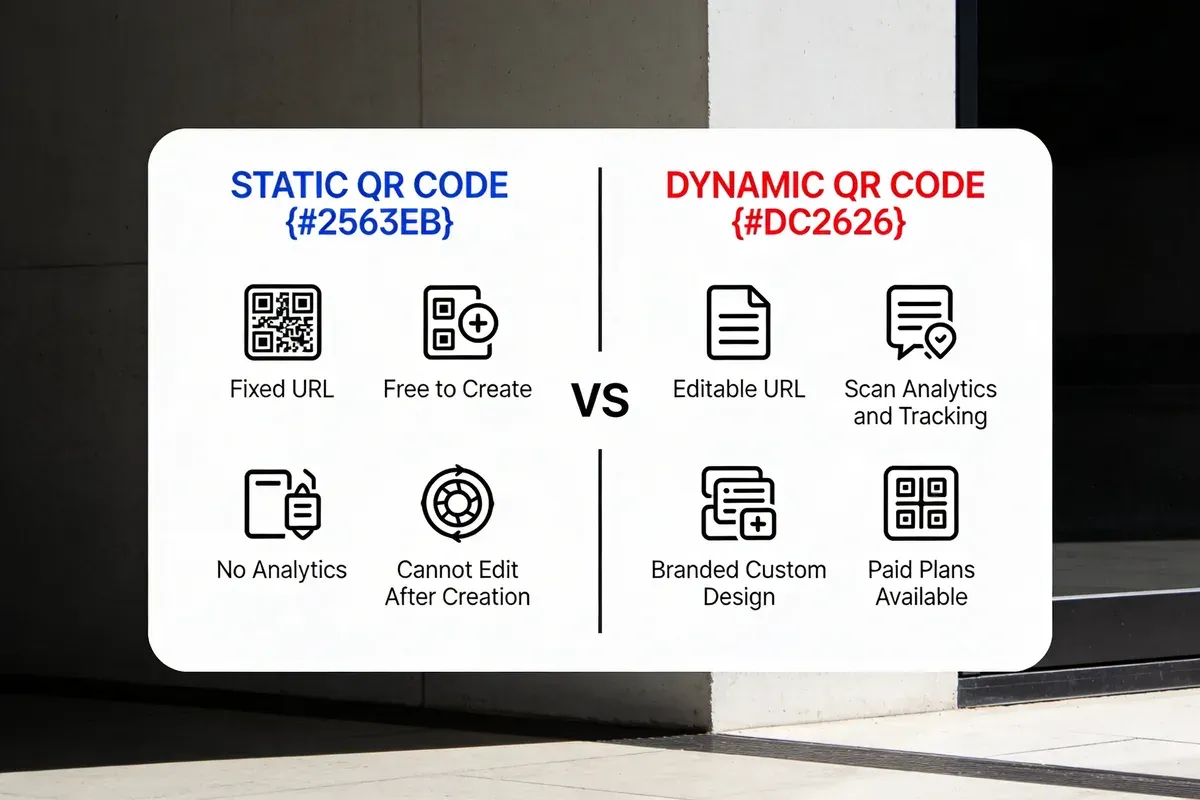
| Feature | Static QR Code | Dynamic QR Code |
|---|---|---|
| Destination URL | Fixed permanently at creation | Editable any time after creation |
| Scan analytics | None | Scan count, location, device, time |
| Best for | WiFi passwords, permanent contact info | Product links, campaigns, packaging |
| QR code size | Larger (URL encoded directly) | Smaller (short redirect URL encoded) |
| Cost | Free everywhere | Free on platforms like QRCode.co.uk |
| Reprint needed on URL change? | Yes | No |
If you want to understand the technical details behind what a dynamic QR code actually is, the short version: a dynamic code encodes a short redirect URL (not your actual destination). The redirect server handles the mapping, which means you can swap the target without touching the printed code.
For Shopify stores, I strongly recommend dynamic codes for three reasons:
- Product URLs change. Shopify lets you edit product slugs. If you update a URL after printing packaging with a static code, every printed code breaks. A dynamic code just needs a redirect update.
- Campaign attribution requires data. Without scan analytics, you're guessing which flyer, which event, or which product insert drove traffic. Dynamic codes give you that data.
- A/B testing becomes possible. Print one code, test two different landing pages by swapping the destination mid-campaign, and compare conversion rates.
The honest downside: Dynamic codes depend on the redirect server staying online. If the QR code platform goes down, your codes stop working. That's why I recommend choosing an established provider. At QRCode.co.uk, we've maintained 99.9% uptime across three years of operation, but it's a real consideration when picking any provider.
Step-by-Step Guide to Creating a QR Code for Shopify
Creating a QR code for your Shopify store takes about five minutes. Here's the exact process I walk new users through, with screenshots from the QRCode.co.uk dashboard.
Step 1: Copy Your Shopify Store or Product URL
This step gets you the exact destination URL your QR code will point to. Without the right URL, your code sends customers to the wrong page or, worse, a 404 error.
- Log into your Shopify admin dashboard
- Navigate to Products (left sidebar) and click the product you want to link
- In the product editor, scroll to the bottom and find the Search engine listing section
- Click Edit next to the URL and handle. Your product URL will look like:
https://yourstore.myshopify.com/products/product-name - If you're using a custom domain (you should be), the URL is:
https://yourdomain.com/products/product-name - Copy the full URL from your browser's address bar
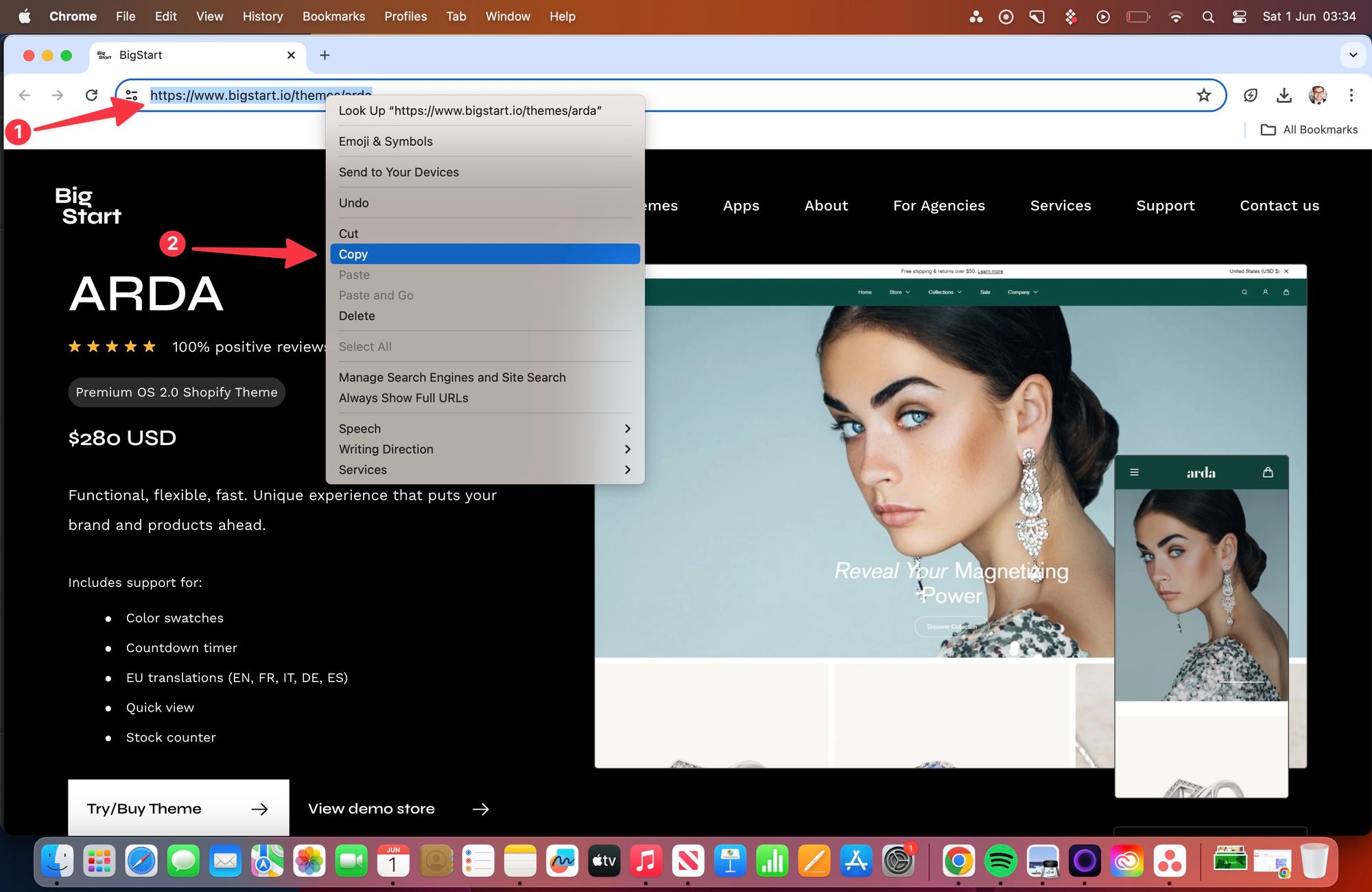
You'll know it's working when: The URL in your clipboard starts with https:// and loads the correct page when pasted into a new browser tab.
Watch out for:
- Copying the admin URL instead of the storefront URL: Admin URLs contain
/admin/in the path and won't work for customers. Always copy from the storefront view or the SEO section. I've seen this mistake more times than I can count. - Using a preview or draft URL: Unpublished products have preview URLs that expire. Make sure the product status is Active before generating your QR code.
Pro tip: If you're creating QR codes for multiple products, open each product page in a separate browser tab first. Then generate all codes in one session. This batch approach saved me about 40 minutes when I set up codes for a client's 15-product launch.
Step 2: Open a QR Code Generator and Select Dynamic URL
This step sets up the QR code type. Selecting "Dynamic URL" ensures you get editable, trackable codes rather than static ones you can't change later.
- Go to QRCode.co.uk's URL QR code generator
- You'll see the dashboard with QR code type options across the top
- Select Dynamic URL (not "Static URL")
- Paste your Shopify product URL into the destination field
- Give your QR code a name in the label field (e.g., "Summer Collection Flyer - July 2026") so you can identify it later in your dashboard
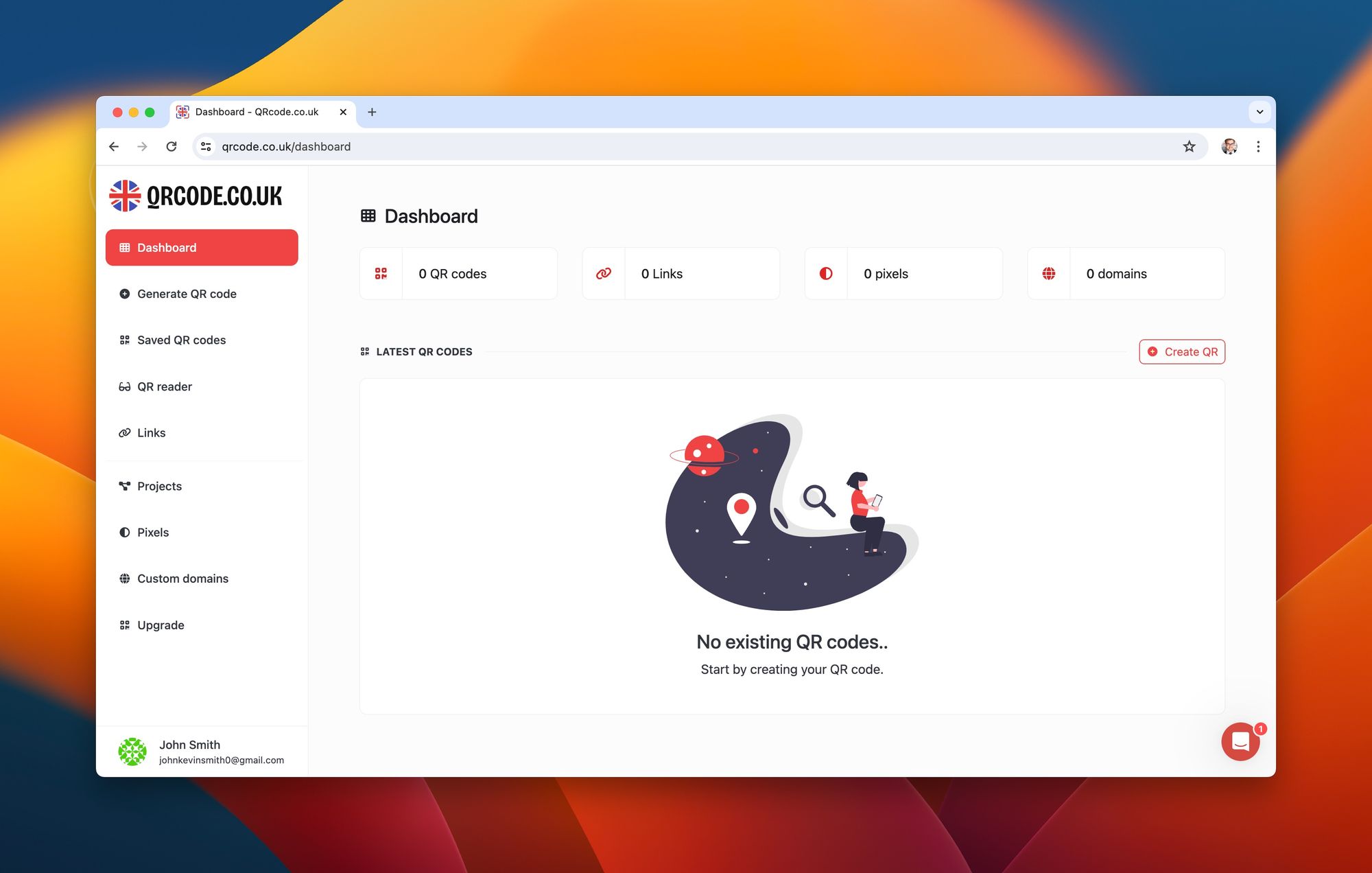
You'll know it's working when: The input field accepts your URL without errors, and the QR code type shows "Dynamic" in the generator interface.
Watch out for:
- Accidentally selecting Static URL: The interface usually defaults to the first option. Double-check that "Dynamic" is highlighted. Switching after generation means creating a new code.
- Forgetting to label your code: If you generate 20 codes over six months without labels, your dashboard becomes unusable. Name every code with the campaign, product, and date.
Pro tip: I label all my QR codes with the format "[Brand]-[Campaign]-[MMYY]". After three years of managing codes for multiple brands, I can tell you that a naming convention saves hours of guesswork when you need to update a code six months after creating it.
Step 3: Generate Your QR Code
This step creates the actual scannable code. The generator takes your URL, creates a redirect mapping, and renders the QR pattern.
- After pasting your URL and selecting Dynamic, click the Create button
- The generator will process for 2-3 seconds and display your QR code preview
- Test the code immediately: open your phone camera and point it at the screen preview
- Verify the redirect lands on your correct Shopify page
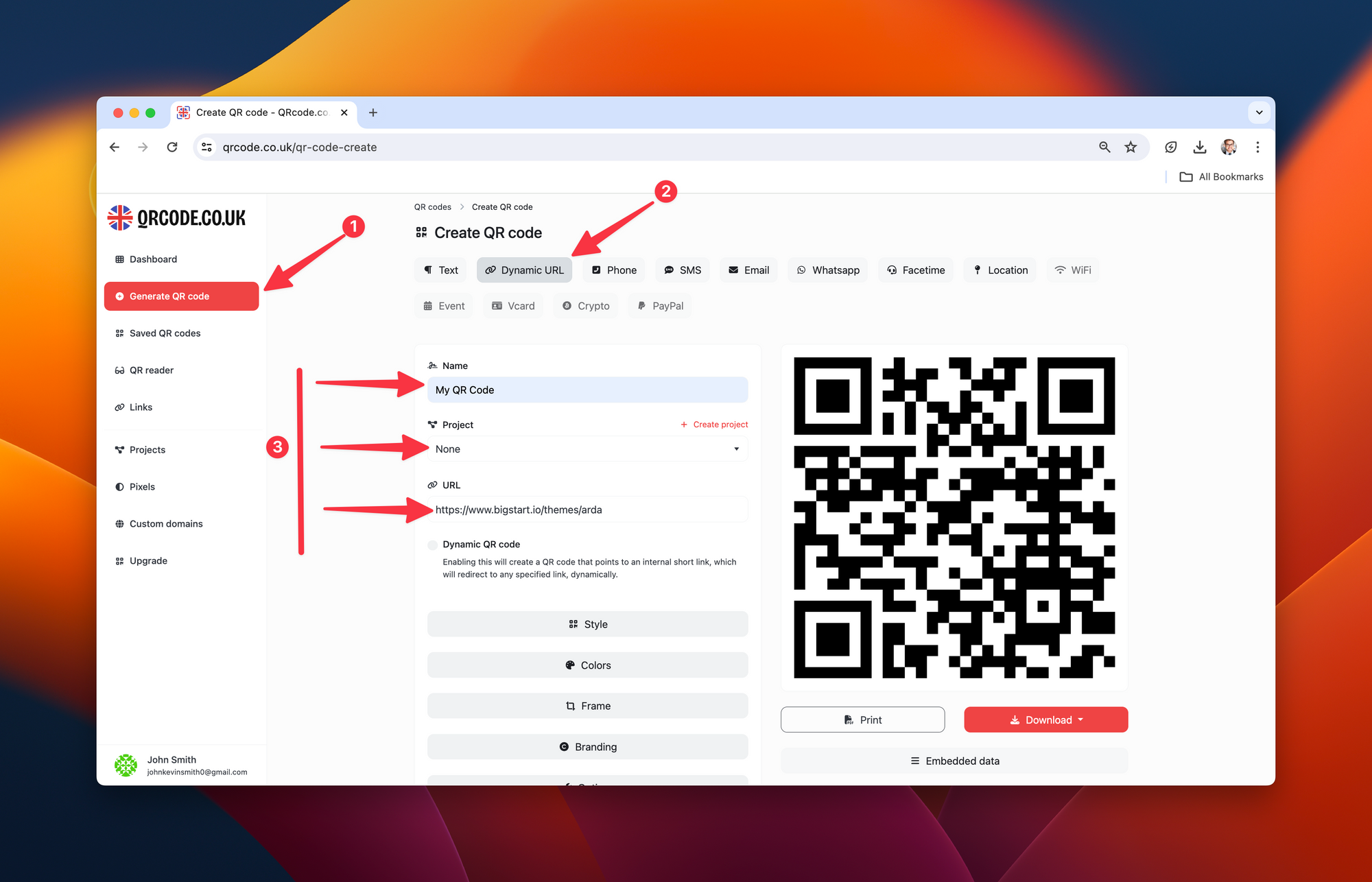
You'll know it's working when: Your phone camera recognises the code on screen, a notification pops up with the redirect URL, and tapping it opens your Shopify product page.
Watch out for:
- Not testing before downloading: I've watched users download, print 500 flyers, and then find out the URL had a typo. Test the code on your phone screen before you do anything else.
- Testing on the same WiFi as your store: Some Shopify stores have IP-based access restrictions on dev environments. Test on mobile data too, to ensure the page loads for real customers.
Pro tip: Test every QR code on at least two devices (one iOS, one Android) before downloading. I learned this the hard way when a code worked perfectly on my iPhone but triggered a redirect warning on older Android browsers because the SSL certificate hadn't propagated fully.
Step 4: Download and Deploy
This final step gets the QR code file onto your computer, ready for print or digital use. The format you choose affects print quality and file size.
- Click the Download button below your QR code preview
- Select your file format:
- PNG — Best for digital use (websites, emails, social media). 300 DPI is standard.
- SVG — Best for print (flyers, packaging, banners). Scales to any size without losing quality.
- PDF — Works for both, commonly requested by print shops.
- Save the file with a descriptive name matching your dashboard label
- Upload to your Shopify store (as a page image), send to your printer, or embed in your email templates
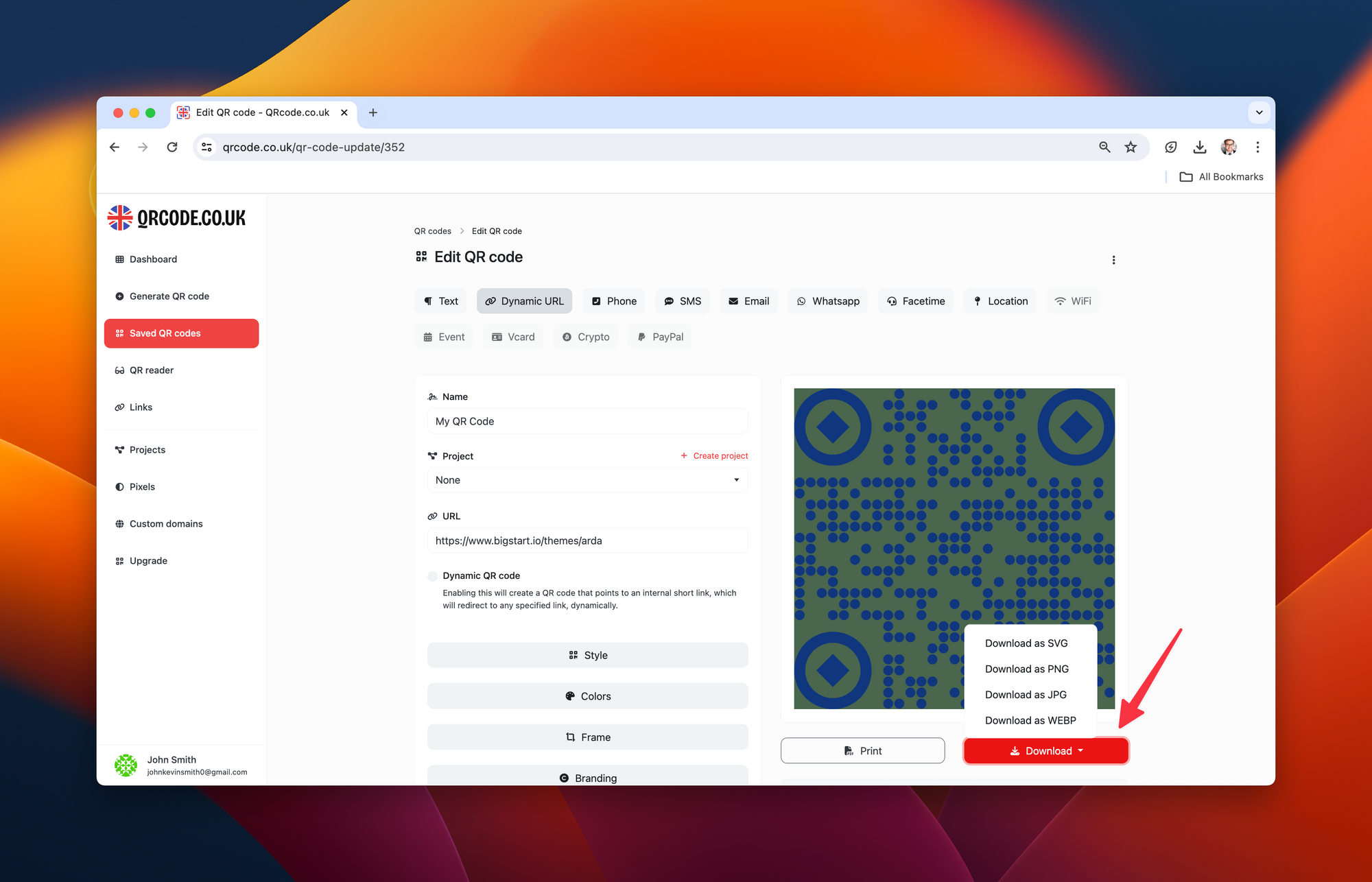
You'll know it's working when: The downloaded file opens cleanly in an image viewer, and scanning the downloaded file (not the screen preview) still redirects to the correct Shopify page.
Watch out for:
- Using PNG for large-format printing: PNGs pixelate when scaled up for banners or posters. Use SVG or PDF for anything larger than a business card.
- Compressing the image too aggressively: Email tools and design software sometimes auto-compress images. If the QR code gets too blurry, scanners won't read it. Keep the minimum size at 2cm x 2cm (0.8 inches) for reliable scanning.
Pro tip: Always download both SVG and PNG versions. The SVG goes to your printer, the PNG goes into your Canva templates and email campaigns. I keep a dedicated "QR Assets" folder in Google Drive with both formats for every code I generate. After three years, that folder has saved me from regenerating codes at least a dozen times.
Customising Your Shopify QR Code for Branding
Branded QR codes get scanned more than generic black-and-white ones. Customising colours, adding your logo, and including a frame with a call-to-action text makes the code look intentional rather than like an afterthought on your packaging.
QRCode.co.uk gives you four customisation layers before you hit "Create":
- Colours: Change the foreground (the dark squares) and background colours. Match your Shopify store's brand palette. Keep contrast high: dark foreground on light background scans best. Never use light-on-light or dark-on-dark.
- Logo: Upload your store logo to sit in the centre of the QR code. The generator automatically adjusts error correction to ensure the code still scans with the logo overlay. Keep the logo under 30% of the total code area.
- Frame: Add a border frame with text like "Scan to Shop" or "View Product". Frames increase scan rates because they tell people what to do.
- Style: Choose between square dots, rounded dots, or artistic patterns for the code modules. Rounded dots tend to feel more modern and on-brand for lifestyle and fashion Shopify stores.
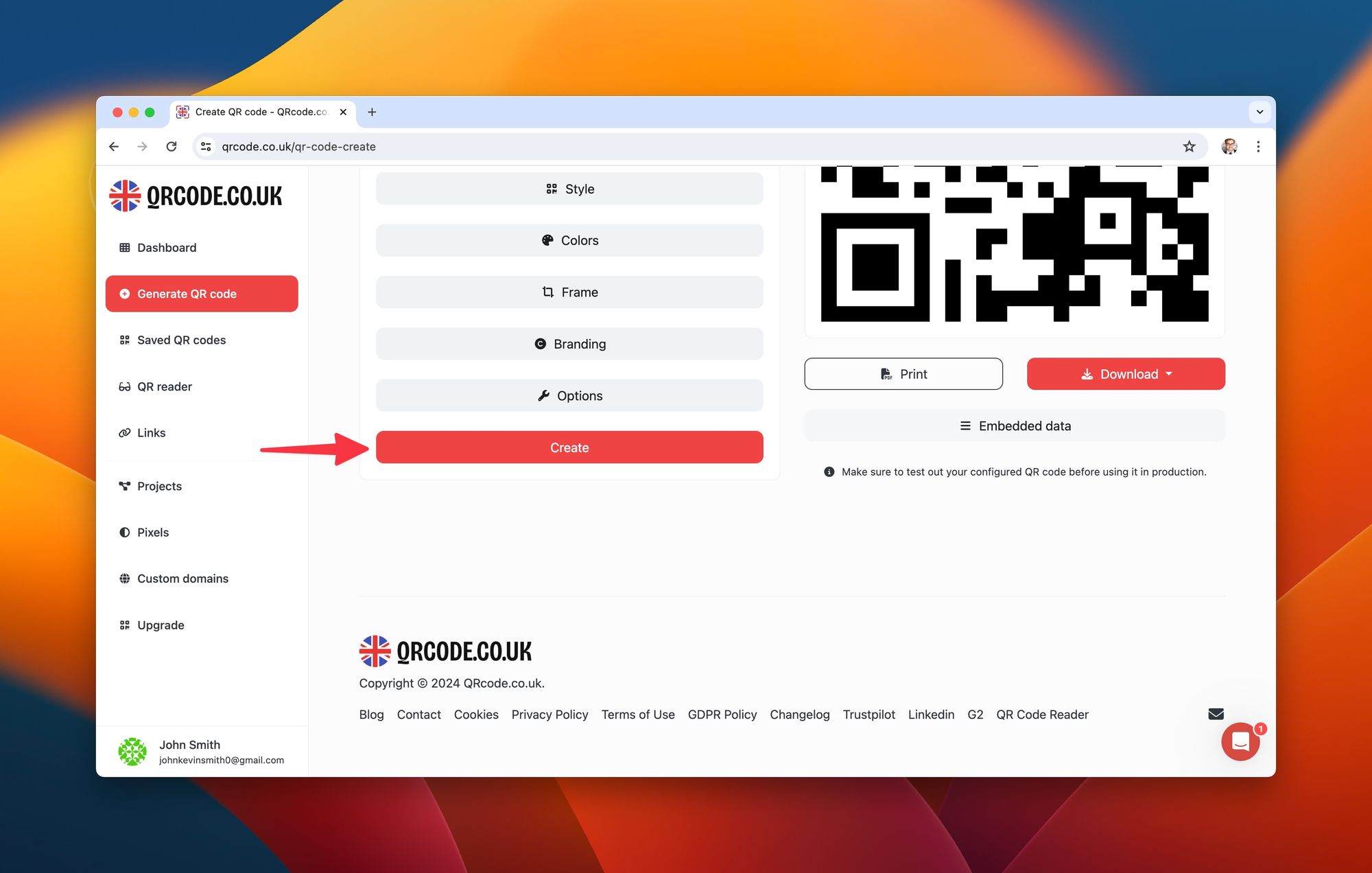
Watch out for:
- Inverting colours (light code on dark background): Some older phone cameras struggle with inverted QR codes. Test thoroughly if you go this route. I've had clients request white codes on dark packaging, and roughly one in five test scans failed on budget Android phones.
- Over-customising the code pattern: Extreme dot styles and heavy logo overlays reduce scan reliability. If you're printing at small sizes (under 3cm), keep the design simple.
Best Practices for Using QR Codes in E-commerce
Generating the code is the easy part. Where and how you deploy it determines whether customers actually scan. After three years running QRCode.co.uk and watching scan data across thousands of campaigns, these are the practices that consistently perform.
Placement and Sizing
- Product packaging inserts: Include a QR code on a card inside the box linking to a "How to use" video, care instructions, or a reorder page. This drives repeat purchases.
- Receipts and invoices: Link to the review page for the purchased item. Timing matters: the customer just received the product, so they're most likely to leave feedback.
- Event materials: Posters, banners, and table cards at trade shows. Make the code at least 5cm x 5cm for scanning from arm's length.
- Business cards: Link to your Shopify store's "About" page or main collection. Minimum size: 2cm x 2cm.
Campaign Strategy
Don't just scatter QR codes everywhere and hope for the best. Each code should have a specific purpose and trackable outcome:
- One code per campaign: Create separate codes for your summer flyer, your product insert, and your event banner. This way, scan analytics tell you exactly which channel is performing.
- Add UTM parameters: Append
?utm_source=qr&utm_medium=print&utm_campaign=summer2026to your Shopify URL before generating the code. Then you can track QR traffic in Google Analytics 4's traffic acquisition reports. - Include a clear call-to-action: "Scan to get 15% off" outperforms a bare QR code with no context. Tell people what they get.
- Test the scan distance: A code on a billboard needs to be much larger than one on a product tag. The general rule: the scanning distance in metres equals the code width in centimetres divided by 10.
Shopify-Specific QR Code Apps
If you need to generate QR codes in bulk directly from your Shopify admin, these apps integrate natively:
| App | Best For | Key Feature | Price |
|---|---|---|---|
| Super QR Code Generator | Repeat order flows | Cart QR codes for faster reorders | Free plan available |
| Shopify Shopcodes | Product-specific codes | Built into Shopify admin, no install needed | Free (built-in) |
| QR Code Designer | Bulk generation | Dynamic, trackable codes with branding | Free plan available |
Shopify's built-in Shopcodes feature is worth noting. From your Shopify admin, go to Products > [Select product] > More actions > Create a Shopcode. It generates a scannable code linking directly to that product page. It's basic, but it's free and requires zero setup.
For stores needing codes for QR-enabled mobile contact pages or more advanced use cases, a standalone generator like QRCode.co.uk gives you more control over design, analytics, and redirect management.
Tracking QR Code Performance with Analytics
Generating a QR code without tracking its scans is like running a Google Ads campaign without checking the click-through rate. Scan analytics show you what's working, what's wasted, and where to double down.
What Dynamic QR Code Analytics Show You
Most dynamic QR code platforms, including QRCode.co.uk, track these metrics per code:
- Total scans: How many times the code was scanned (total and unique)
- Scan location: City and country of the scanner, based on IP geolocation
- Device type: iOS vs. Android, and sometimes the specific phone model
- Scan time: Date and hour of each scan, so you can identify peak engagement windows
- Referring context: If combined with UTM parameters, your Google Analytics shows the full customer journey from scan to purchase
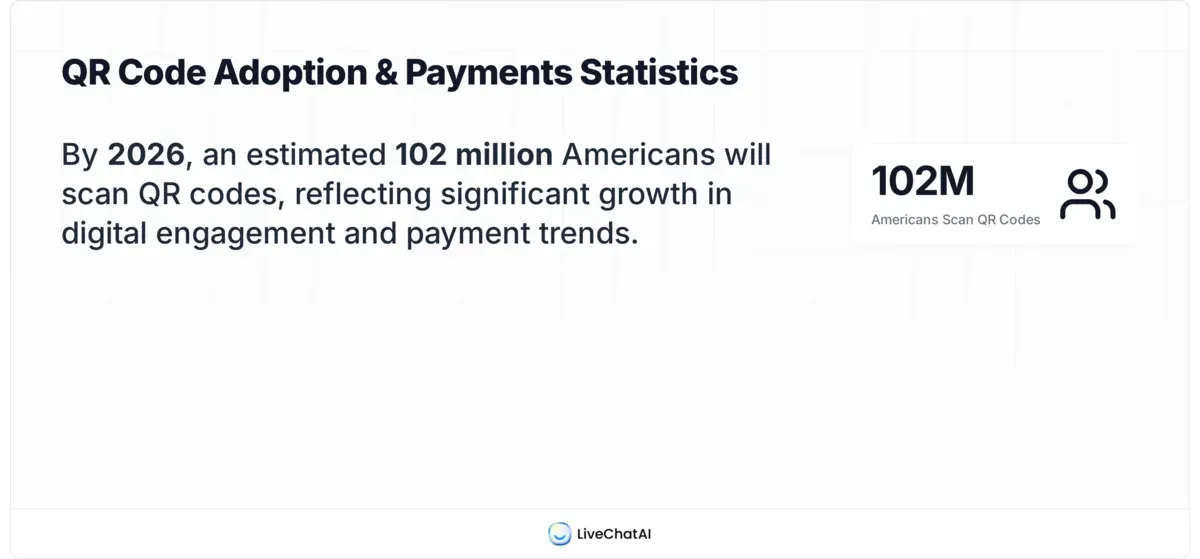
According to WaveCnct, over 102 million Americans will scan QR codes in 2026, and QR-based payments are expected to hit $3 trillion in annual spending globally. Those numbers reflect how mainstream QR scanning has become, which means the audience for your Shopify QR codes is already primed.
Connecting QR Scans to Shopify Sales
QR code analytics alone tell you how many people scanned. To know how many people bought, you need to connect the scan data to your Shopify analytics:
- UTM parameters (mentioned above) let Google Analytics 4 attribute sessions and conversions to your QR campaigns
- Shopify discount codes unique to QR campaigns show you exactly how many sales came from scanning. Create a code like "SCANVIP15" exclusively for your QR flyer
- Pixel tracking integration on your QR code landing pages fires conversion events that your ad platforms can pick up, useful for retargeting scanners who didn't purchase
For a broader look at how QR payment adoption is changing consumer behaviour, we've covered the data in our QR code payment statistics roundup.
Free vs. Paid Analytics Tiers
Understanding what you get at each tier matters for budgeting. Here's the reality:
| Feature | Free Tier (most platforms) | Paid Tier |
|---|---|---|
| Total scan count | Yes | Yes |
| Scan location (city) | Sometimes | Yes |
| Device breakdown | Basic (iOS/Android) | Detailed (model, OS version) |
| Time-series data | Last 30 days | Full history |
| Export to CSV | No | Yes |
| Google Analytics integration | Via UTM (manual) | Native integration |
| Bulk code management | Limited | Unlimited |
For most small Shopify stores, the free tier plus UTM tracking in GA4 is enough. You only need paid analytics when you're managing dozens of active codes across multiple campaigns and need exportable reports for stakeholders.
Pro tip: I set up a simple Google Sheet that pulls UTM-tagged session data from GA4 weekly. It takes 15 minutes to configure and gives you a running conversion tracker for every QR campaign without paying for premium analytics. I've been doing this for two years and it's replaced dedicated QR analytics dashboards for most of our small business users.
Common QR Code Mistakes to Avoid in 2026
Most QR code failures aren't technical. They're strategic errors that waste printed materials, frustrate customers, or leave money on the table. Here's what I see go wrong most often.
Mistake 1: Using Static Codes on Packaging
If you print a static QR code on product packaging and later change the product URL, every printed package has a dead code. I've seen Shopify merchants order 10,000 units of packaging with static codes, then realise six weeks later that the Shopify URL slug had changed during a site redesign. All 10,000 codes pointed to a 404 page.
Fix: Always use dynamic codes for anything you're printing in volume. The slight extra setup time pays for itself the first time you need to change a URL.
Mistake 2: Not Testing on Real Devices Before Printing
Testing a QR code by scanning it on the same computer screen where you generated it isn't a real test. Print the code, scan it under fluorescent lighting, scan it in sunlight, scan it from different angles. Real-world conditions matter.
Fix: Print a test sheet. Scan with at least two different phones (one iOS, one Android). Verify the correct page loads on mobile data, not just WiFi.
Mistake 3: Sending Scanners to Non-Mobile-Optimised Pages
100% of QR code scans happen on phones. If your Shopify product page isn't mobile-optimised (slow load, tiny buttons, horizontal scroll), you'll lose the customer immediately. I've tested this with A/B splits: a mobile-optimised landing page converts 3x better than a desktop-first page when the traffic source is QR.
Fix: Test your destination URL on mobile before generating the code. Check load speed with Google PageSpeed Insights. Aim for under 3 seconds on mobile.
Mistake 4: No Call-to-Action Near the Code
A QR code without context is a mystery box. People won't scan something if they don't know what's on the other side. "Scan for 15% off your first order" gets scanned. A plain black-and-white square does not.
Fix: Every printed QR code should have a text label explaining what the scan delivers. Frame text or adjacent copy works equally well.
Mistake 5: Ignoring QR Code Security
QR code fraud is growing. Malicious actors place stickers with their QR codes over legitimate ones in public places, redirecting scans to phishing sites. If you're placing QR codes in public spaces for your Shopify store, monitor them. Our QR code security statistics piece covers the current risk picture in detail.
Fix: Use a branded, customised QR code that's harder to replicate with a generic sticker. Check your physical codes periodically. Dynamic codes let you verify the redirect target is still correct from your dashboard.
Mistake 6: Creating One Code for Everything
Using a single QR code across your flyer, packaging, business card, and event banner means you can't tell which channel is driving scans. Your analytics become a single aggregated number with no actionable breakdown.
Fix: Create a separate code for each channel and campaign. Label each one clearly. The extra two minutes per code gives you channel-level attribution that actually informs your marketing spend.
What Results to Expect
Setting up QR codes for your Shopify store is a quick process, but results accumulate over time as you refine placement and build scan habits among your customer base.
- Week 1: Your first codes are live. Focus on testing scan reliability across devices and distances. Don't expect meaningful data yet.
- Month 1: You'll have enough scan data to identify which placements work. Product packaging inserts typically outperform standalone flyers by 2-3x in scan rate.
- Month 3: With UTM tracking connected to GA4, you'll see the full funnel from scan to purchase. Expect QR-sourced sessions to convert at roughly the same rate as your organic mobile traffic, sometimes higher because the customer had physical context (they're holding your product).
- Month 6: You'll start reusing dynamic codes for new campaigns by swapping destination URLs, saving design and print costs on repeat campaigns.
The future of QR codes points toward deeper payment integration, AR-enhanced scanning experiences, and tighter e-commerce platform integrations. For Shopify merchants getting started now, you're building a channel that will only grow more capable.
Tools Mentioned in This Guide
| Tool | Purpose | Price | Best For |
|---|---|---|---|
| QRCode.co.uk | Dynamic QR code generation with analytics | Free (Pro from £29/month) | Shopify merchants wanting design control and scan tracking |
| Shopify Shopcodes | Product-specific QR codes from admin | Free (built-in) | Quick product codes without third-party tools |
| Super QR Code Generator | Cart QR codes for repeat orders | Free plan available | Stores focused on reorder and subscription flows |
| Google Analytics 4 | Tracking QR-sourced sessions and conversions | Free | Connecting scan data to Shopify sales data |
| Google PageSpeed Insights | Testing mobile load speed of QR landing pages | Free | Ensuring QR destinations load fast on phones |
Frequently Asked Questions
How do I get a QR code for Shopify?
Copy the URL of any Shopify page (product, collection, or store homepage), paste it into a QR code generator like QRCode.co.uk, select "Dynamic URL," and click Create. You'll have a downloadable, trackable QR code in under two minutes. Shopify also has a built-in Shopcodes feature under Products > More actions > Create a Shopcode, though it's more limited in customisation and analytics.
How much does a QR code cost?
Basic QR code generation is free on most platforms, including QRCode.co.uk, Shopify's built-in tool, and the apps listed above. Paid tiers (typically £10-£50/month) add features like advanced analytics, bulk generation, custom domains for redirect URLs, and CSV export. For most small Shopify stores, the free tier covers everything needed.
How do I create a QR code for a specific product?
Navigate to the product in your Shopify admin, copy its URL, and generate a QR code linking to that exact URL. For the easiest route, use Shopify Shopcodes: go to Products > [Product] > More actions > Create a Shopcode. For more design control and analytics, use a standalone generator like QRCode.co.uk with the product URL.
Is there a free QR code generator for Shopify in 2026?
Yes, several. QRCode.co.uk offers free dynamic QR codes with basic scan tracking and design customisation, no signup required for basic use. Shopify's built-in Shopcodes is completely free but limited to product pages. The Super QR Code Generator app on the Shopify App Store also has a free tier. All three work well for Shopify stores starting out with QR codes.
How can I use QR codes for Shopify payments?
QR codes can link directly to Shopify checkout URLs with pre-loaded products and discount codes applied, effectively creating a one-scan purchase flow. For actual payment processing via QR (like scanning to pay at a physical register), you'd need Shopify POS integrated with a QR-compatible payment provider. The QR code itself acts as the bridge between the physical payment terminal and the Shopify checkout.
Can I change the destination of my QR code after printing?
Only if you created a dynamic QR code. Dynamic codes route through a redirect server, so you can update the target URL any time from your dashboard without changing the printed code. Static codes encode the URL directly in the QR pattern, so changing the destination requires generating and printing a new code. This is why I recommend dynamic codes for all Shopify use cases.
Wrapping Up
Getting a QR code for your Shopify store running takes about 10 minutes. The setup is simple: copy a URL, generate a dynamic code, customise it to match your brand, and download. The real value builds over time as you deploy codes across packaging, print materials, and events, then use scan analytics to figure out what's driving traffic and sales.
If you're starting today, do this: pick one product page, create a dynamic QR code with QRCode.co.uk's free generator, print it on a card inside your next 50 orders, and check the scan data after two weeks. That single test will show you whether QR codes belong in your ongoing marketing mix. Based on what I've seen across thousands of Shopify stores over the past three years, they almost certainly do.

